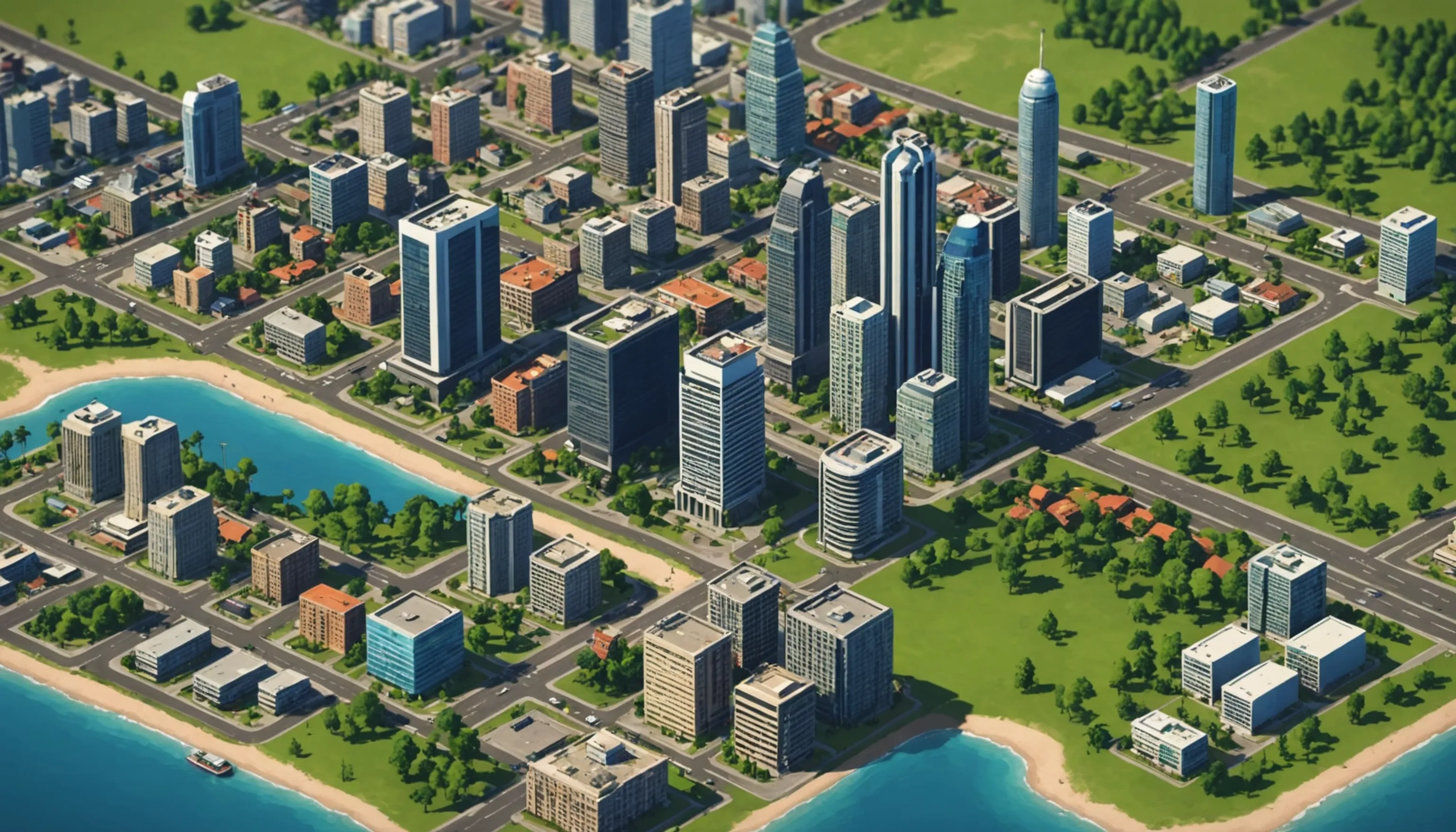Challenging City Management Games for PC
 HvWHenry van Wagenberg
HvWHenry van Wagenberg
Top Challenging City Management Games for PC
If you're looking for the top challenging city management games for PC, you're in for a treat! These games not only entertain but also stimulate critical thinking and strategic planning skills. Titles like Cities: Skylines and SimCity 4 allow players to design and manage intricate urban environments, balancing budgets and meeting the needs of citizens.
Meanwhile, Tropico 6 offers a unique twist by placing players in charge of a small island nation, while Banished challenges them to build a thriving community from scratch. Each game provides an engaging experience that can captivate teens.
Why City Management Games Are Beneficial
City management games offer a plethora of benefits that extend beyond mere entertainment. These games engage players in the intricate process of urban planning and development, fostering a variety of essential skills that are particularly beneficial for teens.
One of the primary advantages of city management games is the enhancement of critical thinking and problem-solving skills. Players must analyze complex situations, consider various factors, and make strategic decisions to ensure the success of their city. For instance, they need to balance budgets, manage resources, and respond to the needs of their citizens.
Additionally, these games promote time management and organizational skills. Players often have to prioritize tasks and allocate resources efficiently, simulating real-world scenarios where these skills are crucial. This can translate to better time management in their academic or personal lives.
Moreover, city management games can foster creativity. Players have the opportunity to design their cities, choosing layouts, infrastructure, and aesthetics that reflect their vision. This creative expression can be a valuable outlet for teens.
Finally, engaging with these games can enhance understanding of social dynamics and community interactions. Players learn to consider the impact of their decisions on various groups, promoting empathy and a sense of responsibility toward community well-being. Overall, city management games serve as a powerful tool for developing important life skills in an enjoyable and interactive way.
Features of Engaging City Management Games
Engaging city management games are designed to captivate players while providing a rich, immersive experience. Several key features contribute to their appeal, making them not just entertaining, but also educational and thought-provoking.
First and foremost, a robust gameplay mechanics system is essential. These games typically offer a mix of resource management, city planning, and strategic decision-making, requiring players to think critically and adapt to changing circumstances. For example, players might need to manage budgets, allocate resources, and address the needs of their citizens.
Another important feature is the visual design. High-quality graphics and immersive environments enhance the gaming experience, allowing players to feel truly connected to their city. Well-designed user interfaces also help players easily navigate complex systems and make informed decisions.
Additionally, engaging city management games often incorporate dynamic challenges. These can range from natural disasters to economic downturns, pushing players to think on their feet and develop creative solutions. Such challenges keep the gameplay fresh and exciting.
Finally, a sense of community interaction is vital. Many games allow players to engage with their citizens through feedback systems, where they can address concerns and improve overall satisfaction. This interaction promotes a deeper understanding of social dynamics and encourages players to think about the broader implications of their decisions.

Best City Management Games for Teens
When it comes to the best city management games for teens, several titles stand out for their engaging gameplay and educational value. Cities: Skylines is a favorite, allowing players to build and manage their own cities, offering deep customization and strategic planning. SimCity 4 remains a classic, challenging players to balance city growth with infrastructure needs. Tropico 6 adds a twist with its island nation scenario, blending humor with strategy. Lastly, Banished focuses on survival and resource management, providing a unique perspective on community building. Each game promotes critical thinking and creativity.
Cities: Skylines
Cities: Skylines is widely regarded as one of the best city management games available, offering players a comprehensive and immersive experience in urban planning. Released in 2015, this game allows players to take on the role of a city mayor, building and managing a sprawling metropolis from the ground up.
One of the standout features of Cities: Skylines is its impressive level of detail and customization. Players can design their cities with various zoning options, including residential, commercial, and industrial areas. They can also manage public services such as education, healthcare, and transportation, ensuring that their citizens' needs are met. The modding community surrounding the game is robust, providing countless user-generated content that adds new buildings, features, and gameplay mechanics, further enhancing the experience.
Additionally, the game’s realistic traffic simulation system challenges players to create efficient transportation networks. Players must balance road layouts, public transport options, and traffic flow to avoid congestion and keep their cities running smoothly.
The game also features a dynamic weather system and a day-night cycle, adding to the realism and immersion. As players progress, they face various challenges, such as natural disasters and economic fluctuations, which test their management skills.
Overall, Cities: Skylines combines creativity, strategy, and realism, making it an exceptional choice for teens interested in city management and urban development.
SimCity 4
SimCity 4 is a timeless classic in the realm of city management games, first released in 2003. This game takes players back to the roots of urban planning, offering a rich and immersive experience in building and managing a city. Despite its age, SimCity 4 continues to captivate players with its depth and complexity.
One of the defining features of SimCity 4 is its regional gameplay, allowing players to manage multiple cities within a single region. This feature provides a broader perspective on city management, as players must consider how each city interacts with others, including resource sharing and transportation networks.
The game also emphasizes the importance of zoning, where players can designate areas for residential, commercial, or industrial use. Balancing these zones is crucial for maintaining a thriving economy and ensuring the happiness of citizens. Players must also manage utilities, such as water, electricity, and waste disposal, which adds another layer of complexity to city management.
Moreover, SimCity 4 introduces natural disasters, adding an element of unpredictability. Players must be prepared to respond to crises, such as earthquakes or floods, which can significantly impact their cities.
With its detailed graphics and engaging gameplay, SimCity 4 remains a beloved title among city management enthusiasts. It encourages critical thinking, strategic planning, and creativity, making it an excellent choice for teens interested in urban development.

Tropico 6
Tropico 6 is a unique entry in the city management genre, offering players the chance to become the ruler of a tropical island nation. Released in 2019, this game combines city-building mechanics with political strategy, allowing players to shape their island paradise while navigating the challenges of governance.
One of the standout features of Tropico 6 is its emphasis on political strategy. Players must manage not only the economy and infrastructure but also the political landscape. Here are some key elements of the game:
- Building a Nation: Players can construct various buildings, including farms, factories, and entertainment venues, to create a thriving economy.
- Managing Resources: Efficient resource management is crucial. Players must balance exports and imports to maintain economic stability.
- Political Influence: Players can engage with different factions, such as the military and the religious groups, to gain support or face opposition.
Another notable aspect is the game's multiplayer mode, allowing players to collaborate or compete with friends. This adds a social dimension to the gameplay, making it even more engaging.
Moreover, Tropico 6 features a rich narrative and humor, with players taking on the role of "El Presidente" and dealing with various challenges, from elections to foreign diplomacy. This combination of city management and political intrigue makes Tropico 6 a fun and educational choice for teens interested in strategy and governance.
Banished
Banished is a unique city management game that distinguishes itself from traditional titles by focusing on survival and resource management. Released in 2014, this game places players in control of a group of exiled travelers who must build a new settlement in an unforgiving wilderness.
In Banished, players face various challenges that require careful planning and strategic thinking. Here are some of the critical features that make this game engaging:
- Resource Management: Players must gather resources like wood, stone, and food to ensure the survival of their citizens. Managing these resources efficiently is crucial to prevent starvation and maintain a healthy population.
- Population Control: Unlike many city-building games, Banished requires players to manage the population growth carefully. Too many inhabitants can lead to resource depletion, while not enough can hinder the community's development.
- Building and Infrastructure: Players can construct various buildings, such as homes, farms, and workshops, to support their population's needs. The placement and type of buildings can significantly impact the efficiency of the settlement.
Additionally, the game features a dynamic weather system that affects resource availability and citizen productivity. Players must adapt their strategies according to changing seasons and environmental conditions.
Overall, Banished offers a challenging and rewarding experience that encourages critical thinking and resourcefulness, making it an excellent choice for teens interested in city management and survival strategy.
Strategies for Success in City Management Games
Success in city management games requires a blend of strategic planning and resource management skills. Here are some effective strategies to enhance your gameplay:
- Prioritize Infrastructure: Ensure that your roads, public transport, and utilities are well-developed to support your growing population. Efficient infrastructure is key to maintaining city functionality.
- Balance Budget: Keep a close eye on your finances. Avoid overspending, and ensure that your income from taxes and services covers your expenses. Consider investing in profitable industries.
- Plan Zoning Wisely: Designate residential, commercial, and industrial zones thoughtfully. Ensure that each area has easy access to amenities and services to keep citizens happy.
- Engage with Citizens: Listen to the needs and feedback of your citizens. Addressing their concerns can lead to a more satisfied and productive population.
By implementing these strategies, players can create thriving cities and enjoy a more rewarding gaming experience.
Planning and Resource Management
Effective planning and resource management are crucial components of success in city management games. These elements not only ensure the sustainability of your city but also foster growth and development. Here are key strategies to enhance your planning and resource management:
Establish Clear Goals: Begin by setting specific, achievable goals for your city. Whether it's reaching a certain population size or generating a specific income, having clear objectives helps guide your planning.
Resource Allocation: Monitor your resources closely, including finances, materials, and manpower. Allocate resources effectively to meet the needs of your citizens while ensuring that your city continues to thrive. Prioritize essential services, such as healthcare and education, to maintain a high quality of life.
Develop a Balanced Economy: Diversify your economy by investing in various industries. This reduces dependency on a single source of income and provides stability during economic fluctuations. Encourage commercial and industrial growth while maintaining sufficient residential areas.
Plan for Growth: Anticipate future needs by planning for expansion. Create zoning areas that can accommodate new developments and ensure that infrastructure can support population growth.
Adapt and Adjust: Be prepared to adapt your strategies based on changing circumstances, such as natural disasters or economic shifts. Flexibility in planning allows you to respond effectively to challenges and seize new opportunities.
By focusing on effective planning and resource management, players can create sustainable and prosperous cities in their favorite management games.
Balancing Growth and Sustainability
Balancing growth and sustainability is a critical challenge in city management games. Players must find ways to develop their cities while ensuring that resources are managed responsibly and environmental impacts are minimized. Here are some effective strategies to achieve this balance:
Integrate Green Spaces: Incorporating parks, gardens, and natural reserves into your city plan not only enhances aesthetic appeal but also promotes the well-being of your citizens. Green spaces improve air quality, provide recreational opportunities, and help mitigate urban heat.
Invest in Renewable Resources: Transitioning to renewable energy sources, such as wind or solar power, can reduce reliance on fossil fuels and lower your city's carbon footprint. Implementing sustainable energy solutions not only benefits the environment but can also lead to long-term cost savings.
Encourage Public Transport: Developing efficient public transportation systems can significantly reduce traffic congestion and pollution. By providing residents with accessible transit options, you promote a healthier lifestyle and decrease dependence on personal vehicles.
Implement Sustainable Practices: Introduce policies that promote recycling, waste reduction, and sustainable building practices. Encourage citizens to participate in eco-friendly initiatives, such as community gardens or cleanup events, to foster a sense of responsibility toward the environment.
Monitor Growth Indicators: Keep track of key indicators, such as pollution levels and resource consumption, to ensure that growth does not come at the expense of sustainability. Adjust your strategies as needed to maintain a healthy balance.
By prioritizing growth and sustainability, players can create thriving cities that are both prosperous and environmentally responsible.
Engaging with Community Feedback
Engaging with community feedback is essential for successful city management in games. Players who actively listen to their citizens can make informed decisions that enhance satisfaction and improve overall city functionality. Here are some effective strategies for incorporating community feedback into your gameplay:
Monitor Happiness Levels: Most city management games provide indicators of citizen happiness. Regularly check these metrics to identify areas of concern. Understanding the factors contributing to dissatisfaction, such as lack of services or pollution, can help you prioritize improvements.
Conduct Surveys: In some games, you can simulate surveys or polls to gauge citizen opinions. Use this feedback to understand what your residents value most, whether it’s public transport, parks, or education. Implement changes based on their preferences to foster a sense of community involvement.
Address Complaints Promptly: If citizens voice complaints about specific issues, respond quickly to resolve them. For example, if traffic congestion is a concern, consider adding new roads or improving public transit options. Demonstrating responsiveness builds trust and loyalty among your citizens.
Encourage Citizen Participation: Create opportunities for citizens to participate in city planning. Allow them to vote on new projects or initiatives. This involvement not only fosters engagement but also makes citizens feel valued and heard.
Adapt to Changing Needs: As your city grows, the needs and desires of your citizens may evolve. Stay flexible and adapt your strategies based on community feedback to ensure that you’re meeting the dynamic demands of your population.
By prioritizing community engagement, players can create a more responsive and thriving city that reflects the needs and desires of its residents.
